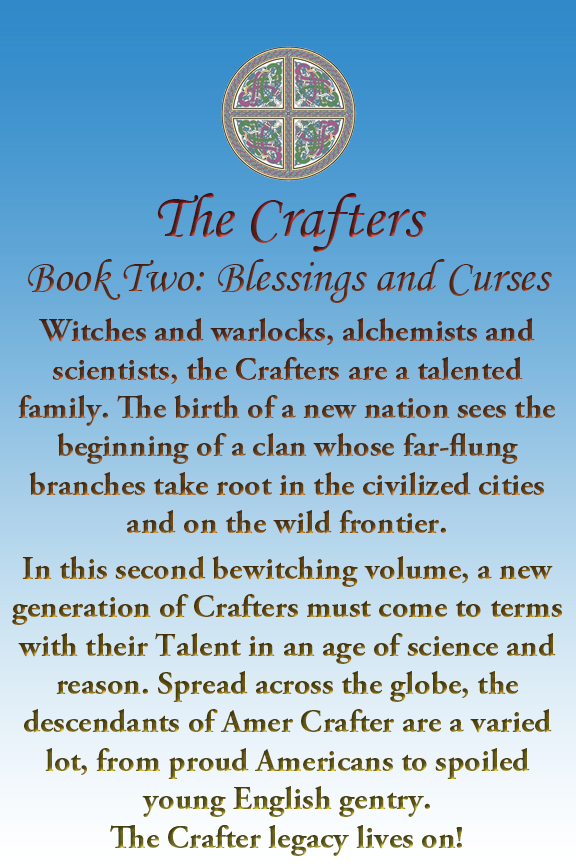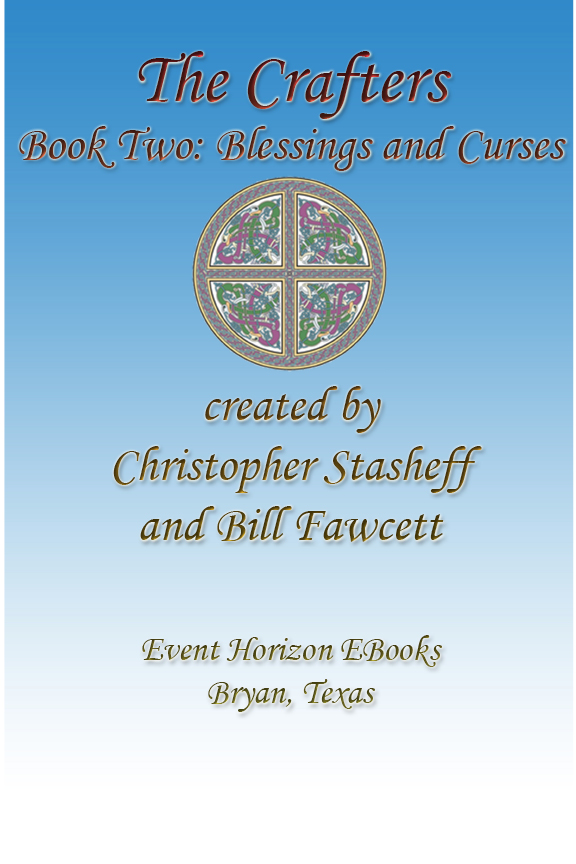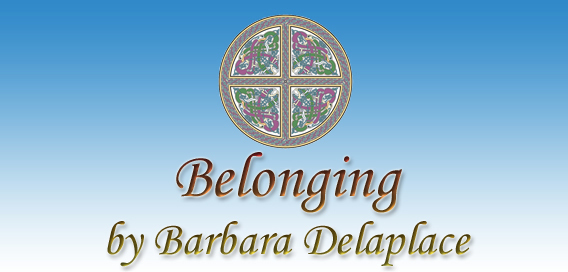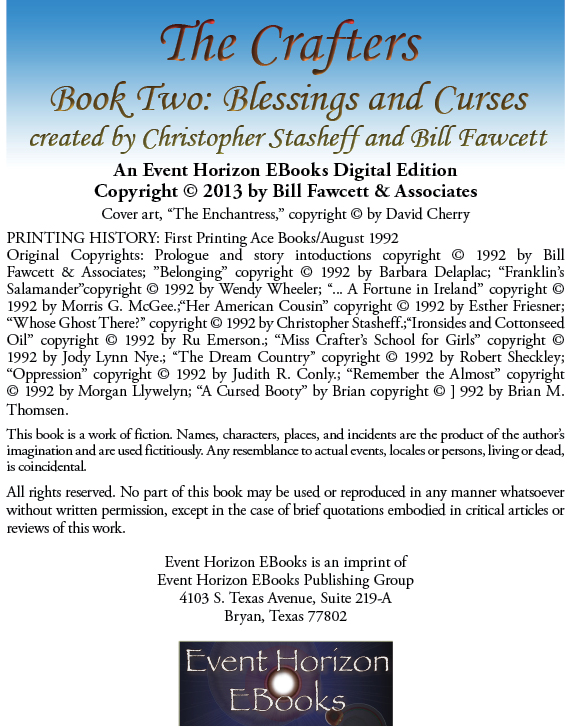The Crafters Book Two
Read The Crafters Book Two Online
Authors: Christopher Stasheff,Bill Fawcett







My name is John Wellington WeIls
I am a dealer in magic and spells,
In blessings and curses and ever filled purses
In prophecies, witches and knells.
— Gilbert and Sullivan,
“The Sorcerer”
The saga of the Crafter Family began in the hills outside Boston at about the same time as the elders in Salem were conducting their much publicized witch trials. In Ireland, Scotland, and Wales they talk of those families whose members “have the weird.” The most magically talented son of one of these families found the puritanical fanaticism and suspicion unbearable and emigrated to the American colonies. On an isolated mountain nearly a day’s ride from Boston he established a lonely homestead. Amer Crafter was an unusual man for his era, or perhaps any era, in that he accepted the Talent he had inherited and studied it using the tenets of the new “natural philosophy.” But the colony was growing and soon Amer had neighbors again.
Where Amer saw a gift, others saw their power as a curse and turned it to darker uses. One of those whom Amer saved from a black coven became his wife. This highly talented couple had six children, all equally gifted. Their children also inherited a wide range of magical talents, often to their own discomfort and danger. When we dream of having the ability to use magic it is easy to concentrate on the novelty of the power and overlook the fact that we would still be a part of our society. Even in the Age of Reason there were many bigots who condemned even the most beneficial use of magic as the Devil’s work. As some do even today, normally on cable TV.
The history of the Crafter Family is tied to the growth of the new land they settled in, and the old land a few returned to. These are but a few chapters in that history.

Lower Canada
Anno Domini 1784
By the time the fourth generation of Crafter descendants were born with their own Talents, many had found ways to live comfortably within the early American society. Those few who didn’t often simply took to the endless and barely habited forests. The frontier, as always, gave them a place to flee an otherwise intolerable situation. It was both a productive and easy means of escape. The cost of this easy escape was often paid by those left behind.
Ungifted. Misfit. Half-breed. She’d lived with those words as a girl.
Tory. Loyalist. Traitor. She lived with those words as a woman.
I wonder if I’ll ever feel I belong?
Rachel pushed the damp hair off her forehead, then continued to stir the clothes in the near-boiling soapy water of the laundry tub. (There was something about doing the washing that made her reflective.) Growing up in the settlement after the breakup of her family, there always seemed to be someone ready to point out that she didn’t fit in, and she’d learned to put on the impassive face of her Iroquois mother whenever it happened. She pushed away the quick stab of sorrow that thoughts of her mother always brought. After so many years, the pain of her death still hadn’t faded away. She stirred harder, her tension easing with the physical effort.
Perhaps the pain would have eased if Father had accepted her death as well. But Nimrod Crafter, ever-rebellious and seldom at peace, had not. And rather than give his daughter into the care of his own parents, who would have welcomed her, he’d left Rachel, a tearful eleven-year-old dressed in deerskins, with the schoolteacher of the small community near the family’s isolated cabin. Then he’d withdrawn to the sanctuary of his beloved forests and Rachel had not seen him again. She’d grown into a woman accustomed to hearing taunts of “Half-breed!” from the cruel and the ignorant, accustomed to walking alone.
Until Michael Wilding came into her life. Tall and broad-shouldered, with a black beard that made his teeth gleam all the whiter when he smiled, he had been drawn to her from the first moment, as she had to him. Their love had only warmed and strengthened through the years since then.
I suppose Father’s still with Thayendanegea,
she mused.
Which meant he’d probably be in Lower Canada, for the great Mohawk leader the settlers called Joseph Brant had gone north after the war, along with two thousand of his people. Loyalists were not welcome in the new republic.
Well, her father wasn’t the only Tory in the Crafter family—and she and Michael had suffered for their loyalty to the Crown. They had been called names, ostracized, and worse. Her husband had once come home from a village meeting bruised and bloody simply for saying that while he hadn’t liked the policies of the British government any more than the next man, he didn’t agree that revolt against the Empire was the answer. So the small Wilding family had also come to Lower Canada, to the fertile land of the Niagara peninsula. There, the rich soil and abundant land had promised peace and a new beginning.
She inspected the clothing in the tub critically and decided it had boiled long enough. Cold water to cool it all down, that was next.
“Leah! Come with Mommy and we’ll go to the stream!” Rachel’s eyes lit up as a dark-haired, merry-eyed whirlwind came rushing to her, spring flowers crushed in one muddy fist. She opened her arms wide to catch the little girl. “Hello, darling! Did you miss me? I missed you.”
Leah rewarded her with a grubby kiss on the cheek. “See, Mommy?” she asked, as Rachel swung her up in her arms.
“Yes, precious, they’re beautiful flowers. We’ll put them in some water. And then your father will be so happy that his little girl picked the flowers for the dinner table tonight! Now, let’s get your brother and we’ll go to the stream. Will you carry the bucket for Mum?”
“I’ll carry the bucket!” Five-year-old Leah loved to help.
Rachel put her down and the little girl ran to get the pail.
Baby Noah was gurgling and watching the world with a wide-eyed gaze, snug in his cradle board. Rachel slid her arms through the straps and eased it to a comfortable position on her back, then stood up. She was about to call Leah again—
—when a strange wave of disorientation swept over her. She was in some other place. Yet she still stood in the clearing in front of the cabin. There was the laundry tub with the embers of the fire still glowing under it. There was the kitchen garden. She tried to step forward, to turn to see Leah, but found she couldn’t move—some awful force held her motionless. Only her eyes could move, and they fell on Noah lying in his cradle in front of her: her baby, flushed with fever and twisting restlessly in his blankets. He was desperately ill, and she didn’t know how to heal him. She tried to reach out to him, to gather him in her arms, tried to say his name, but the force wouldn’t let her. She could only look, fear racing through her. She raised her eyes further and saw Leah lying on her little bed, as flushed and restless as Noah. Her panic grew and she struggled desperately to go to her children. And now she saw Michael lying beyond the children. Sweat shone on his face and he mumbled deliriously. They needed her, she had to go to them. She was gripped with terror. They were her beloveds, more important than anything in the world to her. She had to find the cure ...
“I have the bucket, Mommy. Can we go?” Leah stood before her, unaware of the turmoil within her mother. Rachel blinked. Suddenly everything shifted back to normal. She could hear Noah babbling in the cradleboard, could feel him wriggling as he always did. The awful fear drained out of her.
What had happened?
“Mommy?” Leah asked, with a five-year-old’s persistence.
It must have been a dizzy spell.
She shrugged off further speculation. “Away we go, precious.”
The stream was only a short distance from the rough cabin she and Michael had hastily built when they first arrived. There would be a finished house one day, but clearing land, planting crops, and hunting (to say nothing of a lack of neighbors), put that project into the future. And the cabin was weather tight and warm, if small.
At the stream’s edge, Rachel took the bucket from Leah and filled it. Her daughter splashed in the water, and she was about to warn Leah not to get her dress soaked, when she felt a sudden chill, like a cold breeze blowing along her nape. She looked across the stream. It seemed to be coming from a dark hollow, a cave formed by the overhanging bank.
It must be my imagination,
she thought.
But the chill grew stronger.
There’s nothing there,
she told herself more firmly. She straightened, filled pail in one hand, and reached with her other hand to Leah. “Let’s go back, precious.” The child took her hand, and they went up the trail. Rachel ignored the impulse to look back over her shoulder. Something was
not
peering at them from the hollow!
At the cabin, she took the cradleboard off her back and leaned it against the tree near the laundry tub so Noah could see her. (And so she could see Noah, although she wouldn’t admit that to herself.) Leah ran off to pick some more flowers. Rachel poured cold water from the pail until the water in the tub was cool enough to touch, then positioned the washboard and began scrubbing the clothes.
It’s just that I don’t feel at home here yet, that’s all. That’s what made me nervous at the stream.
She remembered her uncle Deganawidah, named for the prophet of old, and wise in the ways of men and spirits. He was a wanderer, seldom in one place for very long. “Don’t you miss your home, Uncle?” she had asked one time.
He had smiled at her, for he was very fond of Rachel, and called her his pet name. “Little Bird, you carry your home inside you. Once you know who you are and how you stand in relation to the land and the spirits, you’re always at home no matter where you are. Do you understand?”
“No, Uncle,” she had answered.
“Ah, well, you are very young. But you remember my words. One day you will understand them.” And he had hugged her. She could still recall the softness of the wolfskin and the smoky scent of the tanned deerskins he wore.
I guess I still don’t know who I am, Uncle.
She always seemed a misfit, even within her own family. She knew that she lacked the special talents her parents possessed, her father’s gift of knowing thought without speech, her mother’s gift of foreseeing events to come.
Ungifted,
she’d overheard her father say one night when she was supposed to be asleep in the loft above her parents’ heads.
“She may not have come into her gift yet, Nimrod,” her mother’s gentle voice replied.
“I could hear thoughts at her age,” he said. “And you, Mary”—for her mother had taken a second, New England name when she’d married a New England man—”when could you sense things before they happened?”
“I was very young, too. But many of my clan are gifted in the ways of the spirit.”
“So she inherits from both of us.
Something
should have shown up by now.”
“You judge her too quickly, my husband. Rachel will know her gift when the time comes.”
There had been one time when she thought her mother’s prediction had come to pass ... .
* * *
Her uncle was visiting them again. One day he had gone down to the edge of the lake near their lodge to meditate, something he often did. Normally Rachel left him to the solitude he desired at such a time, but this day she had felt lonely and wanted to be near him. So she approached as softly as she could, trying not to disturb his thoughts.
And she had succeeded, for he didn’t notice her. His eyes were closed; his face might have been carved from bronze; his seated figure was motionless on the bearskin he always carried with him. Only the long fur of his wolf skin ruffled in the breeze, the head dangling over his shoulder.
But there was a whisper from her clothing when she sat down in front of him, and his eyes snapped open. And for a moment—for a moment she thought the eye sockets of the wolf’s head glowed with life, as if a living animal were curled around his shoulders. And the bearskin ... the empty paws seemed to fill, the shoulders humped, the head lifted and turned to her, dark eyes watchful. For a moment, she saw the guardian spirits that traveled with her uncle.
Deganawidah seemed to know what she saw, for he told her, “You have eyes that see into the spirit world, Little Bird.
Orenda,
the spirit force in all things, flows strongly in you. And one day, you’ll be able to call on it.”
“Soon, Uncle?”
He smiled at her. “I don’t think soon, Little Bird. It’s a gift you must grow into.” Her face fell, for she so wanted to prove her father’s judgment wrong. “But the time will come when you will need it, and be able to use it.” She looked unconvinced, and he laughed. “Here, then, Little Bird—I’ll give you something to remind you of my promise.” And he had taken a thong from around his neck, one that held a small leather case. “There’s a bear claw inside this, for our family is of the Bear Clan. You wear it now for me, and remember my words. One day you’ll be able to use the spirit power within you.”
* * *
But it had never happened again, and now she was a woman with children of her own. She suspected the time would never come. But she still wore the necklace he’d given her, the only memento she had of that life with her family. Rachel sighed, then realized with surprise that while her mind had traveled to the past to hear the voices of her family, her hands had scrubbed all the clothes. She called to Leah to come help her, and the two of them rinsed the garments in a tub of clean water, after which Rachel hung them on the clothesline stretched between two trees.
It was nearly time for supper. She picked up Noah and went into the cabin with Leah. The stew she’d earlier set over the fire to simmer was sending forth savory odors, and she had biscuits left from that morning. New potatoes and early peas, picked that afternoon, would complete the meal. “Here, Leah, you can shell the peas for me.” So mother and daughter worked together.
She was just finished nursing Noah, or rather, trying to—he was fussing and had little appetite—when Michael strode into the cabin with a double armful of wood and a flashing smile for his family. The wood went tumbling into the wood-box by the fireplace, and he gathered Rachel into his arms.
“Hello, my heart,” he said, and kissed her. She could feel the current of his love flowing through her as she returned his kiss, and she leaned into his strength for a long moment. Time apart from each other made time together the sweeter. Then he released her, and she went back to the stove as he turned his attention to Leah. Michael reached down and picked up his daughter. “How’s my princess?” he asked, kissing her cheek.
“I helped Mommy. I carried the bucket, and I washed clothes, and I shelled peas.”
“All that! You worked hard today, princess.”
“And I picked you some flowers, see?” She pointed to the table, where the flowers now stood arranged in a spare mug.
